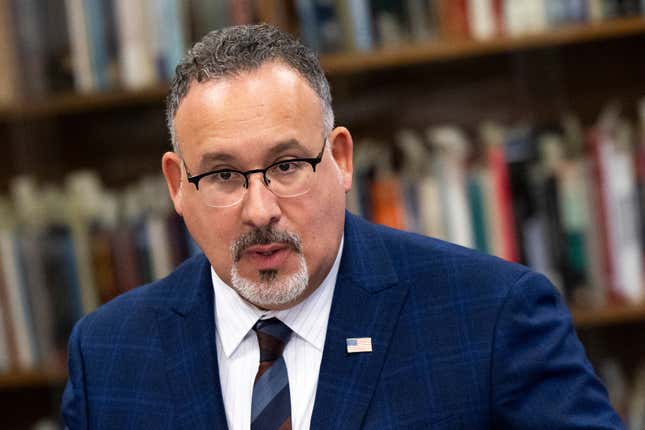
WASHINGTON (AP) — The Biden administration is docking more than $2 million in payments to student loan servicers that failed to send billing statements on time after the end of a coronavirus pandemic payment freeze.
The Education Department said Friday it will withhold payments from Aidvantage, EdFinancial and Nelnet for failing to meet their contractual obligations. The servicers failed to send timely statements to more than 750,000 borrowers in the first month of repayment, the agency said.
Education Secretary Miguel Cardona said his agency will continue to pursue “aggressive oversight” and won’t give loan servicers “a free pass for poor performance.”
The move is the administration's latest attempt to straighten out a process that has been marred by errors after student loan payments restarted in October. Tens of thousands of borrowers have received billing statements late or with incorrect amounts as servicers scrambled to jumpstart the process.
The department previously withheld $7.2 million from loan servicer MOHELA for failing to send statements on time to more than 2.5 million borrowers. The new action will take $2 million from Aidvantage, $161,000 from EdFinancial and $13,000 from Nelnet, based on the number of borrowers who faced errors.
Nelnet said in a statement that less than 0.04% of its borrowers had missing or late statements, including some who chose to move their due dates up “to better meet their situation.”
“While we are confident the number of borrowers with Nelnet-caused billing statement errors is less than the number released we do take seriously our responsibility to borrowers and regret any mistakes made during the extraordinary circumstances of return to repayment," the Nebraska-based company said.
Aidvantage and EdFinancial didn't immediately return messages seeking comment.
Borrowers who did not get statements within the required 21 days before payment will be placed in administrative forbearance while problems are resolved. That means their payments will temporarily be paused and any interest that accrues will be removed. Time spent in forbearance will continue to count toward Public Service Loan Forgiveness and other cancellation through income-driven repayment plans.
“We are committed to providing a seamless repayment experience for borrowers,” said Rich Cordray, chief operating officer of Federal Student Aid, the office that oversees federal student loans.
Republicans say the Biden administration's action is an attempt to shift blame elsewhere for a sloppy return to repayment. Louisiana Sen. Bill Cassidy, the top Republican on the Senate Health, Education, Labor and Pensions Committee, said the administration failed to give servicers clear guidance. He has asked the Government Accountability Office to investigate.
More than 22 million borrowers started getting bills again in October after a moratorium that froze payments and interest for more than three years. Bringing that many borrowers online at the same time was an unprecedented task that overwhelmed servicers hired by the government. Many borrowers received bungled bills only to face hours-long wait times for customer service.
To ease borrowers back, the Education Department is offering a one-year “on-ramp” that waives the harshest penalties for borrowers who miss payments. Until next September, borrowers won’t be found to be delinquent for missing payments and they won’t be subject to debt collection.
Early figures from the Biden administration found that 60% of borrowers with payments due in October had made those payments by mid-November.
Even as payments restart, the administration is working toward a new proposal for widespread student loan cancellation after the Supreme Court rejected Biden's first plan last June.
The new plan has yet to be finalized but the department hopes to provide targeted relief to certain groups of borrowers, including those with loans taken out more than 25 years ago, those with snowballing interest, and borrowers whose colleges leave graduates with high levels of debt compared to their earnings.
The new proposal is going through a process known as negotiated rulemaking. A final proposal is expected in coming months, although opponents are almost certain to challenge the cancellation in court.
___
The Associated Press’ education coverage receives financial support from multiple private foundations. AP is solely responsible for all content. Find AP’s standards for working with philanthropies, a list of supporters and funded coverage areas at AP.org.